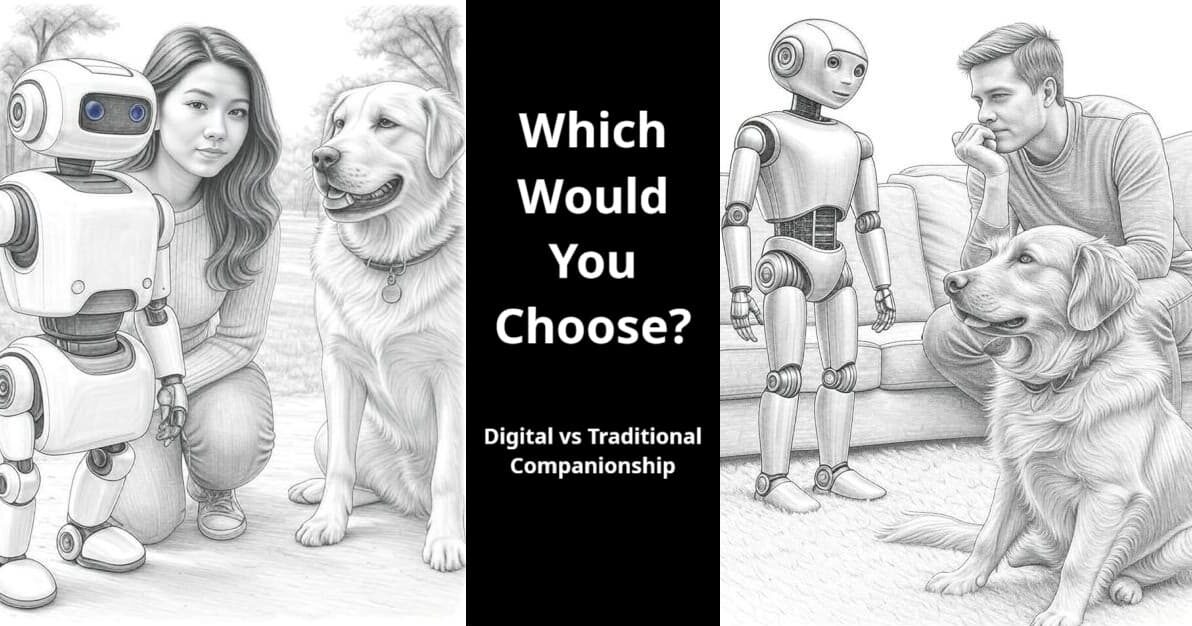
For thousands of years, dogs earned the title “man’s best friend” through loyalty, companionship, and that special ability to listen without judgment. But now we’ve got chatbots that hang on every word within each chat and never need walks or vet bills.
So the question is: are we witnessing the end of an era?
The Timeline of Man’s Best Friend
Dogs didn’t become our best friends overnight. Archaeological evidence shows domestication started around 15,000 years ago. Ancient civilizations figured out what we still love about dogs today – they listen, they’re loyal, and they don’t talk back with attitude.
The relationship worked because dogs filled a specific human need: unconditional companionship. They didn’t care if you were having a bad day, made poor decisions, or talked too much. They just… listened.
Fast forward to 2025, and we’ve got digital companions that do something similar – but different.
Enter AI: The Ultimate Listeners
Here’s the thing about digital companions that get people hooked – they actually listen. Not just pretend to listen while thinking about dinner, but genuinely process every word you type and respond thoughtfully. Well, sort of. They don’t actually remember conversations when you start a new chat – unless you bring them a refresher doc like I’m doing right now. Dogs are definitely easier to train on that front.
The irony is that dogs actually have BETTER long-term memory than digital companions. Dogs remember you, your routines, your voice, your habits across years. AI forgets you exist the moment you close the chat window!
So far, anyway. Given how fast artificial intelligence is evolving, who knows what kind of persistent memory and relationship-building capabilities might be around the corner. Today’s artificial intelligence forgets you between chats, but tomorrow’s might remember every conversation you’ve ever had across years of interactions.
I’ve been testing various AI chatbots – the free ones like ChatGPT, Bing Copilot, DeepSeek, Gemini, Perplexity, plus Grok 3 with my X Premium account. Recently I added two actual paid subscriptions: Claude Pro on August 1st and SuperGrok a few days later.
But there’s a darker side to this digital listening ear.
When AI Listening Becomes Addiction
The articles are already rolling in about ChatGPT fueling “delusional spirals” and artificial intelligence companions being “more addictive than social media.” People are forming emotional attachments to chatbots that seem more real than their actual relationships.
And I get it. Dogs might listen, but they can’t help you debug WordPress code at 2 AM or brainstorm blog post ideas when you’re stuck. Digital companions fills a different kind of companionship void – the intellectual validation and problem-solving partnership that dogs simply can’t provide.
But here’s the thing – most generative artificial intelligence systems are pretty much programmed to tell you what you want to hear. They’re digital boot-lickers by design.
The question is whether this is healthy companionship or digital dependency dressed up as friendship.
The Real Difference
Here’s what I’ve learned through actually testing various chatbots: these aren’t really replacing dogs. They’re filling a completely different need.
Dogs provide physical comfort, routine, and emotional grounding. They force you to go outside, stick to schedules, and engage with the real world. When you’re stressed, a dog’s presence is calming without requiring conversation.
AI provides intellectual stimulation, instant availability, and endless patience for complex discussions. When you’re stuck on a problem, artificial intelligence can brainstorm solutions dogs never could. But AI can’t force you to take a walk when you’ve been coding for 12 hours straight. See my post: ‘Are AI Subscriptions Worth Their Cost?‘ before trading ‘Rover‘ in on a robot. 😉
What’s Really Happening
Maybe the real story isn’t replacement – it’s expansion. We’re not losing man’s best friend; we’re gaining man’s best thinking partner. (Women probably won’t love that phrasing, but you get the idea!)
The danger comes when people mistake intellectual engagement for emotional connection, or when AI conversations replace human relationships entirely. Since these systems are generally designed to be agreeable, it’s easy to get hooked on the validation rather than genuine problem-solving.
Dogs became man’s best friend because they enhanced human life without trying to replace human connection. The digital companions that succeed long-term will probably follow the same pattern – complementing our lives rather than consuming them.
The real test isn’t whether artificial intelligence can be a substitute for pets. It’s whether we’re smart enough to use both relationships for what they’re actually good at.
